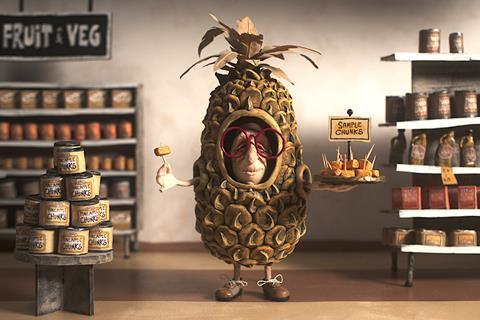Oscar-winner Adam Elliot’s tragi-comic claymation is voiced by Sarah Snook and a rogue’s gallery of Australian character voices

Dir/scr: Adam Elliot. Australia. 2024. 94mins
A melancholy introvert by nature, Canberra resident and snail fan Grace Pudel (voiced by Sarah Snook) has lived a life so beset by tragedy that she has retreated further and further into her shell. On paper, the second feature-length stop-motion animation from Oscar-winning director Adam Elliot (Mary And Max) seems unremittingly bleak, a tragi-comedy with the emphasis firmly on the tragi side of things. But Elliot is a master of the art of gallows humour, and this appealing ‘clayography’ (the term coined by the director for his distinctive stop motion biographical stories) is as hilarious as it is heart-wrenching – frequently within the same scene.
As hilarious as it is heart-wrenching
Memoir Of A Snail, which premieres in competition in Annecy before opening the Melbourne International Film Festival, is the seventh part of Elliot’s proposed ’Trilogy of Trilogies’, (three short shorts, three long shorts, three features). It confirms Elliot, who won an Oscar for his short film Harvey Krumpet in 2004, as one of the most distinctive voices currently working in animation. The unmistakable authorial fingerprint that Elliot brings to his pleasingly crude claymations has resulted in a strong fanbase for his work, and this should help the film navigate the tricky market for teen- and adult-themed animation. Madman will release in Australia and IFC in North America, and the film sealed multiple international deals ahead of its Annecy bow.
There are few consolations to Grace’s drab existence in Canberra; her friendship with an eccentric elderly woman called Pinky (Jacki Weaver), her vast collection of snail-themed tat, and the hope that she will be reunited with her twin brother Gilbert (Kodi Smit-McPhee). But this story, as narrated by Grace to her favourite pet snail Sylvia (named after Sylvia Plath), is not entirely without joy. There are treasured moments of happiness, memories that Grace hoards along with her suffocating clutter of snail memorabilia and revisits when the loneliness grows too heavy to bear.
Key among these is a visit to a funfair with her brother and their paraplegic, wheel-chair bound father. The three ride a rickety roller coaster together (it looks as though it was hammered together from bits of old sheds) and, for a moment, they are weightless, the sadnesses of mother’s death, father’s accident, bullying at school are all temporarily lifted.
But the levity is brief. The father succumbs to his sleep apnoea; the twins are placed into foster care, separately and in different states. Grace finds herself in suburban Canberra (shown here as a hotbed of key parties and swinging, and bearing the brunt of the film’s sly Aussie in-jokes) with a well-meaning but clueless childless couple, Ian and Narelle (both voiced by Paul Capsis). And while Gerald draws the shorter of two very short straws – he is placed with a family of apple farmers who are members of a bizarre and punitive religious cult – it is Grace whose spirit is slowly broken by her lonely existence.
To fill the emptiness, she hoards. Mostly it’s books and snail-related items that she collects but, as her depression digs in, Grace’s compulsion morphs into kleptomania. An abortive, doomed relationship with a bad sort (Ken, voiced by Tony Armstrong, is intent on shaping Grace into his plus-sized ideal woman) doesn’t help matters. But Grace’s friendship with Pinky is a lifeline. Pinky’s role in the film is equally significant – thanks to Weaver’s deliciously droll voice work, Pinky brings a buoyant comedy that parts the clouds on this dryly morose story.
Although the picture is rather narration-heavy at times, Elliot is a visual storyteller first and foremost. He harnesses texture – there’s a whole lifetime of adventures etched into the wrinkles on Pinky’s face – and uses colour expressively. The palette is predominantly composed of unpromising slurry browns and defeated, sullen-looking greys. Even the reds, a hue that normally delivers a jolt of energy and optimism, have a disconsolate, rusted quality. Equally as powerful is the film’s timeless and tender score, by Australian classical composer Elena Kats-Chernin. The lovely, ornate musical motifs bring a quiet dignity to this tale of a woman who refuses to be defeated by misfortune.
Production company: Arenamedia
International sales: Charades sales@charades.eu; Anton international@antoncorp.com
Producer: Liz Kearney
Cinematography: Gerald Thompson
Production design: Adam Elliot
Editing: Bill Murphy
Music: Elena Kats-Chernin
Voice cast: Sarah Snook, Kodi Smit-McPhee, Jacki Weaver, Eric Bana, Magda Szubanski, Dominique Pinon, Tony Armstrong, Paul Capsis, Bernie Clifford, Davey Thompson, Nick Cave






![The Brightest SunScreen[Courtesy HKIFF]](https://d1nslcd7m2225b.cloudfront.net/Pictures/274x183/3/5/0/1448350_thebrightestsunscreencourtesyhkiff_312678.jpg)















![The Brightest SunScreen[Courtesy HKIFF]](https://d1nslcd7m2225b.cloudfront.net/Pictures/100x67/3/5/0/1448350_thebrightestsunscreencourtesyhkiff_312678.jpg)

